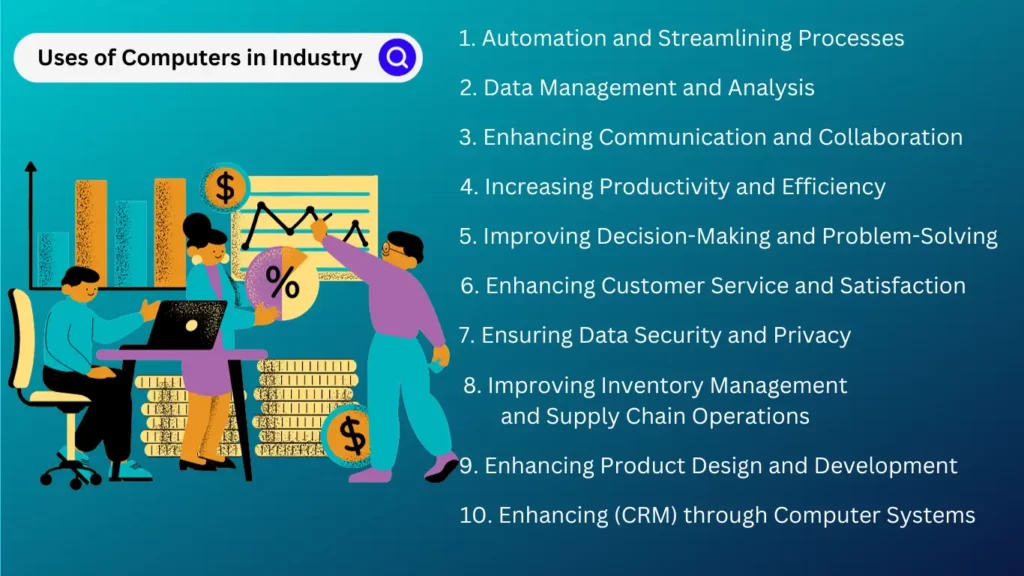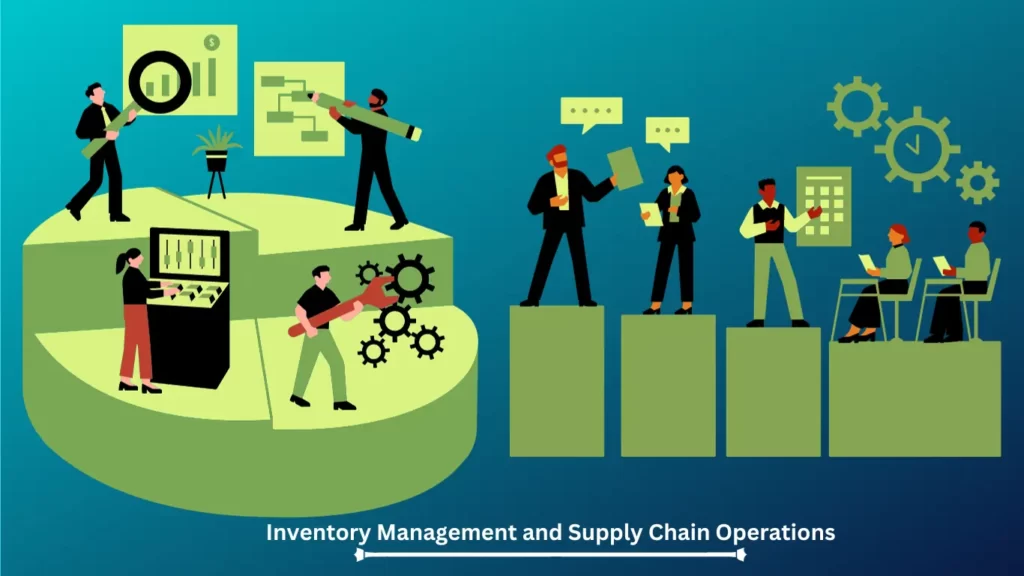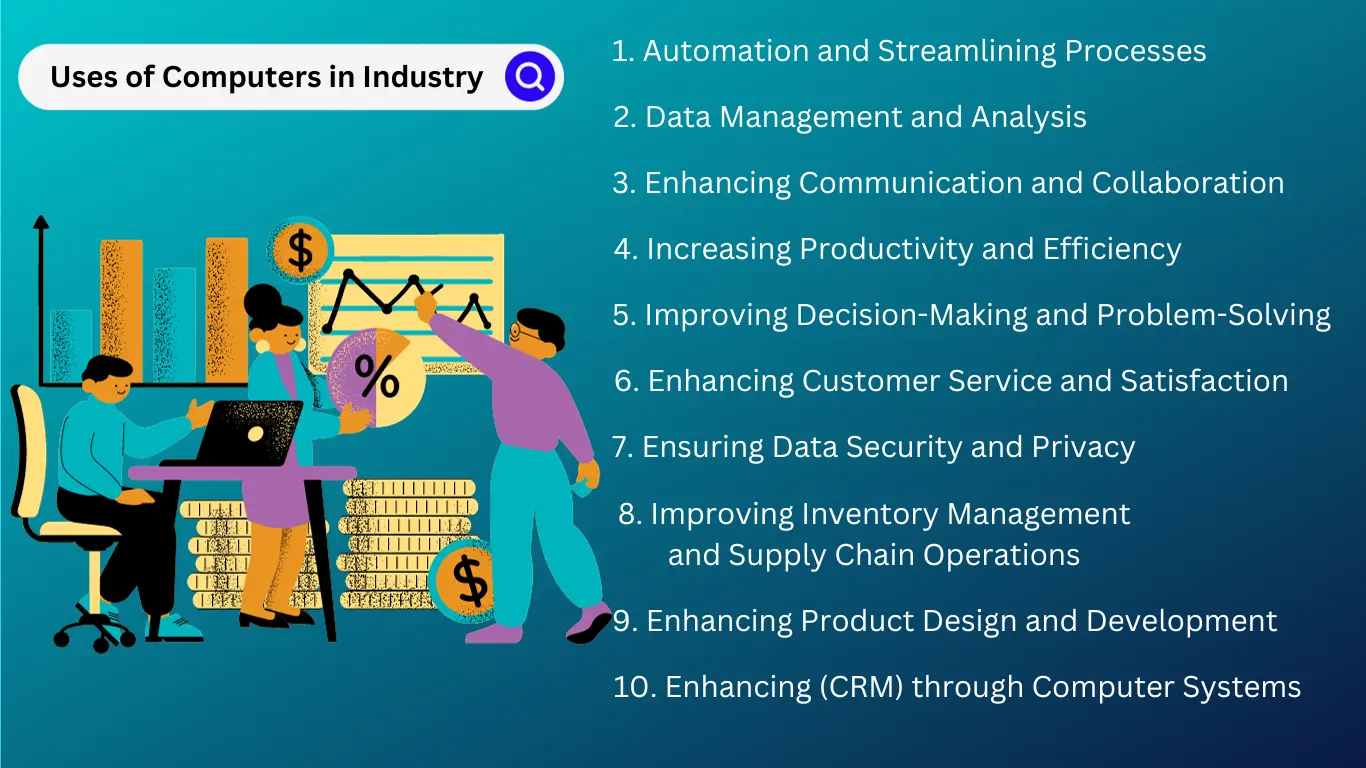Uses of Computers in Industry: Computers have revolutionized the way industries operate, opening up limitless possibilities for enhanced performance and profitability. In today’s fast-paced world, businesses across various sectors have harnessed the potential of computers to streamline processes, manage data, improve communication, increase productivity, and make informed decisions.

The uses of computers in industry are vast and have transformed traditional practices into efficient and effective methodologies. From automation to data analysis, let’s delve into the key applications of computers in industry and explore how they can drive success.
Unveiling the Key Uses of Computers in Industry
1. Automation and Streamlining Processes
By utilizing computer systems, businesses can automate repetitive tasks, reducing the need for manual labor and increasing overall efficiency. This enables employees to focus on more complex and strategic activities, ultimately improving productivity and reducing costs.
Computers facilitate the integration of various systems, allowing for seamless communication and coordination between different departments. For example, in a supply chain scenario, computers enable real-time tracking of inventory levels, enabling timely replenishment and avoiding stockouts.
2. Data Management and Analysis
Computers play a vital role in collecting, storing, and analyzing vast amounts of data, providing valuable insights that can drive informed decision-making. Through the use of databases and data management systems, businesses can organize and retrieve data efficiently, ensuring easy access to essential information.
Computers have transformed data into a valuable asset, empowering businesses to gain a competitive advantage in the industry. By leveraging these insights, businesses can make data-driven decisions, optimize processes, and tailor their strategies to meet customer demands.
3. Enhancing Communication and Collaboration
Computers have revolutionized these aspects, providing various tools and platforms for effective communication and collaboration within and between organizations. With the advent of email, instant messaging, and video conferencing, geographically dispersed teams can collaborate seamlessly, fostering teamwork and innovation.
Computers enable the creation of centralized platforms, such as project management systems, where employees can collaborate on tasks, track progress, and share documents. This eliminates the need for manual coordination, reduces miscommunication, and enhances productivity.
4. Increasing Productivity and Efficiency
Computers have revolutionized the way businesses operate by enabling faster and more accurate processing of tasks. From word processing software to specialized industry-specific applications, computers provide tools that enhance productivity and streamline workflows.
computers enable multitasking, allowing employees to handle multiple tasks simultaneously. This can significantly increase productivity, as individuals can switch between different tasks without the need for physical movement. By leveraging the power of computers to increase productivity and efficiency, businesses can maximize output, meet customer demands, and stay ahead of the competition.
5. Improving Decision-Making and Problem-Solving
Computers provide businesses with the tools and capabilities to make informed decisions and solve complex problems. Through advanced algorithms and modeling techniques, computers can analyze vast amounts of data, identify patterns, and generate insights that aid in decision-making.
Moreover, computers enable businesses to simulate scenarios and evaluate the potential outcomes of different strategies. This allows for risk assessment and mitigation, ensuring that decisions are based on a thorough understanding of the potential consequences.
6. Enhancing Customer Service and Satisfaction
Customer service is a cornerstone of business success. Computers have transformed the way businesses interact with customers, enabling enhanced customer service and satisfaction. From automated chatbots to online customer support portals, computers provide businesses with tools to deliver timely and personalized customer service.

Computers enable businesses to collect and analyze customer data, allowing for a deeper understanding of customer needs and preferences. This information can be utilized to tailor products and services to meet customer demands, resulting in increased customer satisfaction and loyalty.
7. Ensuring Data Security and Privacy
Computers provide businesses with robust security measures to protect sensitive information and ensure the privacy of their customers. From firewalls to encryption algorithms, computers enable businesses to implement multi-layered security systems that safeguard their data from unauthorized access.
Computers facilitate the implementation of data backup and recovery systems, ensuring that critical information is not lost in the event of a disaster. By leveraging the power of computers for data security and privacy, businesses can instill trust in their customers and protect their reputations.
8. Improving Inventory Management and Supply Chain Operations
Efficient inventory management and supply chain operations are crucial for businesses to meet customer demands and maintain profitability. Computers have transformed these aspects, enabling businesses to optimize their inventory levels, reduce costs, and improve order fulfillment.
By utilizing computer systems, businesses can track inventory in real-time, ensuring that stock levels are maintained at optimal levels. This minimizes the risk of stockouts or overstocking, leading to improved customer satisfaction and reduced holding costs.

Computers enable businesses to streamline supply chain operations, facilitating seamless coordination between suppliers, manufacturers, and distributors. This improves the overall efficiency of the supply chain, reduces lead times, and enhances customer satisfaction.
9. Enhancing Product Design and Development
In industries that rely on product design and development, computers play a crucial role in enhancing the efficiency and effectiveness of these processes. Through computer-aided design (CAD) software, businesses can create and modify digital models of products, enabling faster prototyping and iteration.
CAD software provides businesses with tools for precise measurements, simulations, and analysis, ensuring that products meet design specifications and performance requirements. This eliminates the need for physical prototypes, reducing costs and speeding up the product development cycle.
10. Enhancing (CRM) through Computer Systems
Computers provide businesses with robust CRM systems that enable them to manage customer interactions, track sales, and analyze customer data. Effective customer relationship management (CRM) is crucial for businesses to build strong relationships with their customers and drive loyalty.
CRM systems allow businesses to centralize customer information, providing a holistic view of customer preferences, purchase history, and interactions. This enables businesses to personalize marketing campaigns, tailor product recommendations, and provide exceptional customer service.
Computers enable businesses to automate routine CRM tasks, such as lead generation and follow-ups, freeing up valuable time for employees to focus on building relationships with customers. By leveraging the power of computer systems for CRM, businesses can nurture customer loyalty, increase sales, and drive long-term profitability.
11. Implementing Computer Systems for Financial Management and Accounting
Computers provide businesses with robust financial management and accounting systems that automate processes, reduce errors, and provide real-time financial insights. Accurate financial management and accounting are crucial for businesses to ensure compliance, make informed decisions, and drive profitability.
Computer systems enable businesses to track and record financial transactions, ensuring accurate and up-to-date financial information. This facilitates timely reporting, budgeting, and forecasting, enabling businesses to make informed financial decisions.
By leveraging the power of computer systems for financial management and accounting, businesses can streamline processes, improve financial transparency, and drive profitability.
12. Utilizing Computers for Quality Control and Testing in Industry
In industries where quality control and testing are crucial, computers play a vital role in ensuring product excellence and customer satisfaction. Through computer systems, businesses can implement robust quality control and testing processes, minimizing defects and ensuring compliance with industry standards.
Computer systems enable businesses to automate quality control procedures, ensuring that products meet stringent quality requirements. From automated testing equipment to computer vision systems, computers provide businesses with tools to detect defects, measure product parameters, and validate quality.

Computers enable businesses to track and analyze quality data, identifying trends and patterns that can lead to process improvements. By leveraging these insights, businesses can continuously enhance their quality control processes, ensuring consistent product excellence.
Conclusion: Uses of Computers in Industry
Computers have become indispensable tools in the industry, revolutionizing traditional practices and driving enhanced performance and profitability. From automation to data analysis, computers enable businesses to streamline processes, make informed decisions, and deliver exceptional customer service.
As technology continues to advance, businesses must embrace the power of computers and stay abreast of the latest developments. By investing in computer systems and leveraging their capabilities, businesses can unlock new opportunities, drive innovation, and navigate the ever-evolving business landscape.

